Filipino producer Alemberg Ang on Isabel Sandoval's 'Moonglow' and his new doc 'Pony Boys'
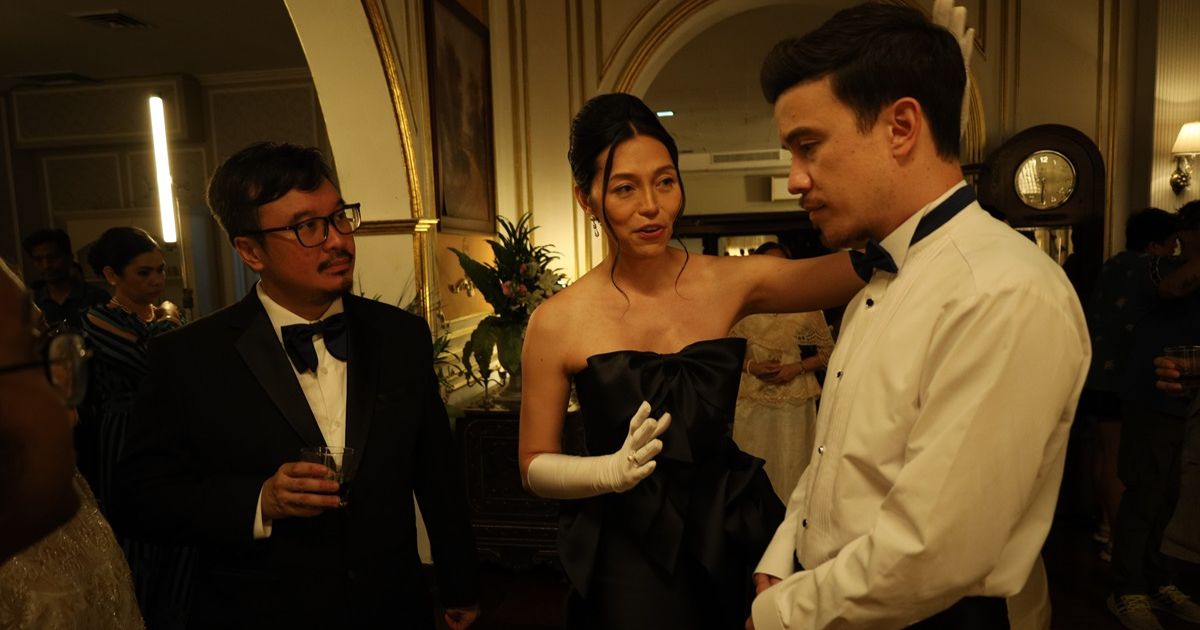
It was a collaboration bound to happen.
Producer Alemberg Ang and award-winning Fil-Am filmmaker Isabel Sandoval are collaborating for Sandoval's fourth feature, the new crime thriller Moonglow starring Arjo Atayde ("Trigger," "BuyBust").
They met in 2012 but nothing happened yet. Sandoval recalled in our email interview, "I first met Alem at the 2012 Cinemalaya Independent Film Festival when my second feature 'Apparition' premiered. The previous year he produced 'The Dance of Two Left Feet,' one of the finest films to debut at Cinemalaya, so I knew he had exquisite taste as a creative.
"Over the years, his reputation as a producer grew alongside what is shaping up to be an impressive, adventurous filmography, the Cannes-lauded 'Plan 75' being a recent highlight.
"When the strike in Hollywood happened, I knew that I wanted to come back to the Philippines during that hiatus and make a film—something that is artistically exhilarating, a project that would challenge me as a filmmaker and showcase the dizzying heights that Philippine cinema can aim for—and there was only one producer I wanted to make that film with. So, I reached out to Alem."
Ang, who has established a name as an internationally recognized producer in the festival circuit, admitted to us when we met at the 77th Cannes Film Festival that he is also a big fan of Sandoval's work.
The charming and boyish-looking Ang said of his first meeting with Sandoval, "I was already producing. But mostly Cinemalaya, the smaller independent films. I loved Apparition. I told her that and then from there we connected.
"But then I never heard back from her again. And then I posted that, oh I'm going to New York, I want to meet some friends. Isabel sent me a message. And she said, 'You're going to New York, let's meet.' So, we met. But at that point, we were talking about working together. It was just catching up after so many years of not really knowing each other."
Sandoval described how it was working with Ang on Moonglow, "I felt completely in my element as an artist with a producer like Alem, who had my back and staunchly championed my vision. Moonglow was such a bold swing and a major gamble for everyone involved—an ambitious project in both theme and production scale that we had to shoot in 20 days. That Alem managed to assemble a team both in front of and behind the camera of the pedigree that he did so swiftly—Agot Isidro and Carlitos Siguion-Reyna are among the supporting cast; acclaimed auteurs like Remton Siega Zuasola and Whammy Alcazaren in our creative team—speaks to what a powerhouse producer he is. Moonglow happened because Alem made it happen. I would work with Alem again in a heartbeat."
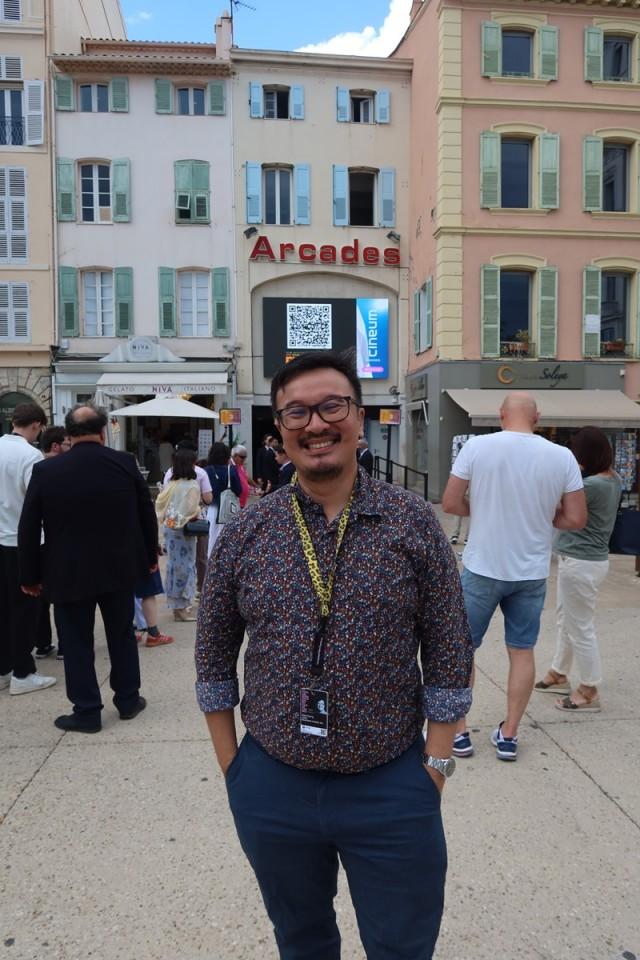
Talk about Moonglow. How was it working with Isabel?
Oh my God, she's the best person I've ever worked with. In fact, my stylist said she is my peg for Chill. Can you imagine? She's already the actress. She wrote the script, by the way. And she's the actress and she's the director. And yet, she's the chillest person on the script.
So, what's the story of Moonglow?
Moonglow is about this police investigator played by Isabel herself.
Is it contemporary?
No, it's set in the '60s and the '70s during the Marcos administration. There's a police investigator who is Isabel. He was commissioned by the police chief to investigate a heist and the heist happened at the home of the police chief.
Somebody stole a lot of money from the police chief's house and because he's the police chief he doesn't want to tell people. He looked for somebody he trusted, who is Isabel and the police chief's nephew, played by Arjo Atayde, who was not actually a police officer then.
He was a trainee before, but then he went to America to be a lawyer. He's back for a vacation. So, he hired the two of them to investigate this heist. And the thing is, they had a past. She's a housewife, and here she wants to be part of the police force, so she didn't go with him and now that he's back. They're kind of being paired together again by the police chief to do this investigation.
Is it a suspense drama?
It's a crime noir with some truth in it. But you know Isabel, she's a very poetic, sensual filmmaker. So, it's a different noir. Like from the other Asian type of crime thriller, this is very Isabel.
I saw your photos; you were shooting in Manila.
Yeah, because it has to look '60s, '70s. So, we had to look for places that felt a little more authentic. We had to look for these places, and most of them were in Manila. We found some in Quezon City. So, we were filming in Quezon City but mostly in Manila. In Chinatown, in Escolta.
How was Isabel's transition going back and working again in the Philippines?
At the start, we were doing well. We were doing fine. She was able to adapt. I mean, she did cinema films with budgets like peanuts. She was adjusting up until the heat wave. She was having a hard time with the heat. Because it was like 41, 42 degrees Celsius. It feels like 50 plus with the humidity.
So, we had to pivot. We shot most of the indoor scenes at night, just so that it's not as hot. Then only the exterior scenes that we had to shoot outdoors, we shot those during the daytime. It was the heat.
It was in the newspaper, the heat wave in Southeast Asia. It was that bad. But everything else, like for example, we'll tell her, oh, I'm so sorry, this is too expensive, or something happened. For example, because we're using vintage cars. Imagine these vintage cars in Manila's traffic in the heat. So sometimes, they don't make it. They don't make it to our set.
So, they have costumes and everything?
Yeah. I love our stylist. It's Whammy Alcazaren, who's also a filmmaker, but a production designer. His last short that he directed was in Sundance. So, I have a very fantastic team.
How many weeks did it take you to shoot?
We really did it in 20 days. For American cinematographers that that's few days but for us, that's luxury.
When do you plan to release it?
Isabel is editing now. We hope to send it to maybe the autumn festivals or if not then the winter festivals. And then our grand ambition, but maybe it can be the Philippine entry to the Oscars. But we don't know. This is like a dream. I think every filmmaker's dream. So, we don't know. We're just doing our best and hopefully, we'll get there.
Who else is in the cast?
So, Isabel, Arjo Atayde, and Sylvia Sanchez. We got the current interim president of CCP, Dennis Marasigan. We have Paolo O'Hara from the O'Hara clan. So, we have these big names.
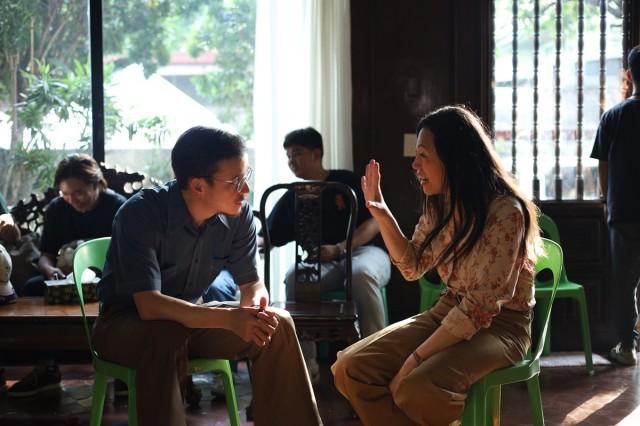
Yes. At first, she conceptualized it with Sarge Lacuesta, who is an award-winning novelist. But eventually, Sarge is filming his first film, so he became quite busy with his own film. Then Isabel continued writing it and worked on it on her own.
So, during the heatwave...
Because of that, we had to cancel some shoots. Arjo got sick. Delays to the point that our last filming day was at 9 a.m. on Mother's Day. We were able to wrap up shoot, went home to finish packing, had a quick lunch with my mom for Mother's Day, and then at 3 p.m. I was on my flight to Cannes.
Talk again about the challenges of setting it in the '60s and '70s, how did you go about it? Especially the costumes.
We had some costumes made, and some were borrowed costumes. We borrowed stuff from people. At first, we were thinking how faithful we can be to the period. But eventually, Isabel said, 'You know what, let's be faithful to the spirit of the film. Let's be faithful to what we want to say. And all these other things that will slow us down or bug us down, let's not be too worried about that." Because at the end of the day, it's a good story, a well-made story that's more important than getting the right button or the right shoe.
Would you say this has political overtones since it's set during the Marcos years?
Yeah, well, you know my films, they always do. But we wanted it to be accessible, and we didn't want it to be in-your-face. And that's also why I like 'Apparition,' Isabel's second film, it was also set during martial law. But it's not in your face. We're not doing a documentary.
You were with her in Venice the other year.
Yes, and then when she was pitching Lingua Franca, I was pitching another film. And so, we were almost always in the same Berlinale talent. That's when she was pitching 'Tropical Gothic.' I was also there pitching another film.
Is this mostly in Tagalog?
Yes. Tagalog with English. Because in the '60s and '70s, they speak a lot of English.
How is your Cannes experience so far?
Well, I don't know if you've seen my post. I think the greatest number of steps I took was 24,000 steps in one day. I had a day of 20,000. As I've said, I wasn't here last year. And what I do in Cannes is really reconnect with all my mostly European friends or partners.
Give us a background. What do you do? Are you looking for co-financers?
Co-producers, sales agents, festivals, and then distributors for all the projects that I have. Some are in development, some about to shoot, and then some in post. I was very fortunate a few years ago, I got into EAVE. It's our European Audiovisual Entrepreneurs. It's an organization for producers who work in the European market. Media practitioners, mostly film, who want to work in the European landscape. They give workshops every year. It's very competitive. It's super hard to get in. I applied three times. It's my third time that I got in.
Why do you think you finally made it?
For one, I was the first Filipino to get in and only the third Asian. I applied with an Afghan documentary. I was applying with the Filipino projects before, but I applied with an Afghan documentary. And the director has been through quite a good festival with her first doc. And so, she has a name already, and I think that may have moved the needle a bit. Plus, because it's my third time to do it and I just finished Ties That Bind which is an EAVE program as well. The people know me already and what I do. And so, I have built a stronger filmography and a stronger profile of myself. So that's why I think that cut got me it.
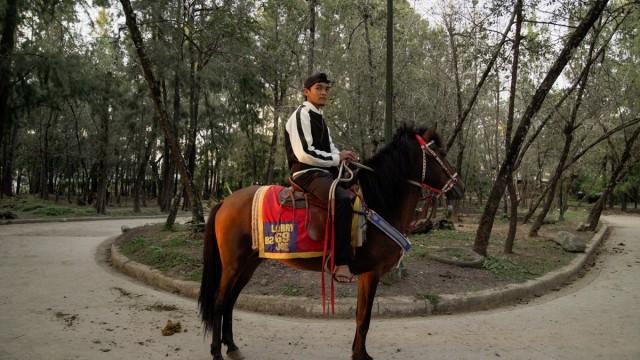
It's my second film with the director. The first film that we made it's also a documentary, called Divine Factory. It's about this small factory in Antipolo where they make rebulto, the Catholic figurines, the Virgin Mary, the Saint Joseph.
But what made this small factory very interesting is most of the workers are LGBTQ. So, imagine LGBTQ making rebulto.
My favorite scene is a transgender painter, she's painting the Virgin Mary, and my director asked her, "What were you doing before you were a painter?" She said, "I was a cam girl, like a camera girl, I would pose on the internet for Europeans and Americans. I would perform and if they like me, they come and spend a week in the Philippines with me."
So, I guess it's some type of online prostitution. It's just so fascinating that she's telling us this story while painting the Virgin Mary. And you have Mother Teresa on the table. So that went to Doc Life and went to some festivals.
We also presented at Cannes Docs before, and we won that time. So, they asked us again under the Docs by the Sea program. The Docs by the Sea is a documentary incubator program in Bali. And they have a showcase. So, they chose four projects. Two from Taiwan and two from Southeast Asia. And they chose us, they chose Pony Boys.
So, Pony Boys is basically about the horse handlers in Baguio. Remember when you go to Baguio, people would like to ride a horse around either Camp John Hay or Wright Park and go around Baguio. So, these are the ones who are pulling the horses, feeding the horses, taking care of the horses.
What did you find interesting about them?
It's not me, because my director is Joseph Mangat. He lived in New York for a very long time. He studied in San Diego; his family is in San Diego. Then he moved to New York in Brooklyn. And then while working at Divine Factory, he decided to move back to the Philippines. And then he found this interesting.
He found a news article during the pandemic about how there was no money to feed them and there would be injuries and no money to take care of the horses. It's very expensive and there are no tourists. The whole country is shut down. So, there are no tourists going to Baguio. So, he found this interesting.
Initially, we were documenting what was happening to the horses. Some horses are being sold for horse meat. Some are eating manure; they are making fertilizer. And so, to the point that since they can't take care of the horses, they let them go, they brought them to a ravine, let them go, and they are roaming there to fend for themselves.
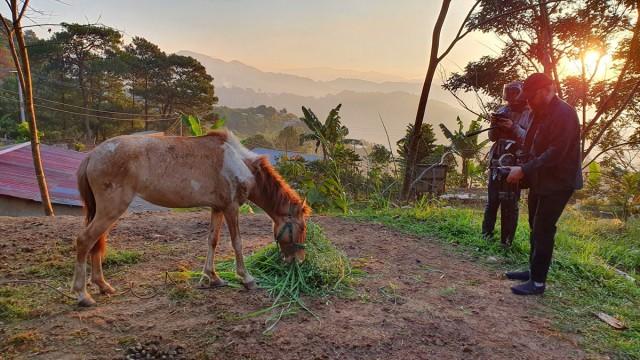
This tradition of the Pony Boys that started during the American occupation that the Americans found the lowlands to be so hot that they carved Baguio City into the mountains. They brought this whole tradition of cowboys and taking care of the horses up in the mountains. After generations and generations from Baguio who did this, now they're hiding from the lowlands. We're exploring how the Ifugao culture, the culture up in the north, infusing this with the cowboy/Indian. They like to wear mohawks.
Do the boys live together?
Yeah, they live with the horses. Because they're from the lowlands, they don't have a place to live so they live in the stables. This is what the documentary is about. The lives of these horses.
How did you meet this filmmaker?
His name is Joseph Mangat. He actually wanted to do a feature film and he wanted to do research in the factory. So, his cousin was my student in Xavier School. I used to be a high school teacher. And so, he said, I have a cousin who's a filmmaker. He wants to go to Manila. He wants to do research on these figurines in Antipolo. Maybe I can go with him. That's how it started. In his research for his fiction film, he found the whole place so interesting, he turned it into a documentary.
Are the Pony Boys back in business?
Yes, they are. That's what we're now showing. We're 80 percent done. We just want to show the last 20 percent.
Were they able to get the ponies back from the ravine?
Some, but not all. But now, the tourists are coming back. So, they're in business again.
—MGP, GMA Integrated News




